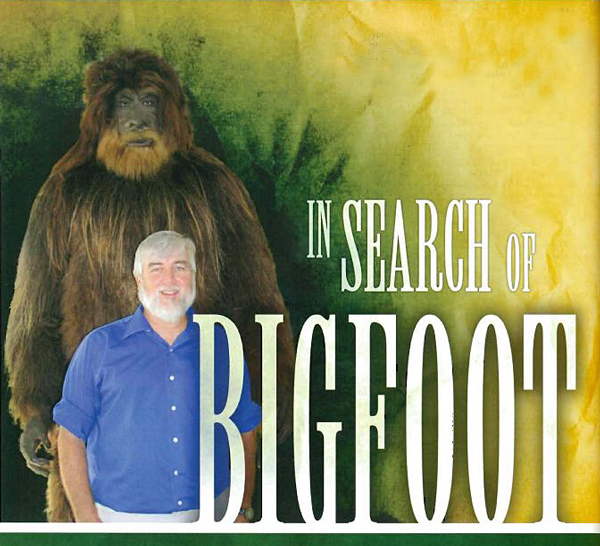
December 16, 2012
USA Today published Matt Moneymaker’s top ten locations to help you do your own “finding Bigfoot.”
Almost ten years ago, in my book on the hairy forest giants, I tackled this topic, with hints to actually see “Bigfoot,” even if only in replica.
I share my old list for fun and comparative reasons. But you can see that these locations I point out do tend to be the best cryptotourism sites for Bigfoot fans, and include what would become sites of future film locations, such as utilized by the forthcoming Exists film.
Here’s my list.
Twenty Best Places to See Bigfoot
by Loren Coleman, adapted from Bigfoot! The Story of True Apes in America, (2003).

You’ll have a better chance of seeing a Bigfoot or finding a footprint in one of the following “hotspots” than anywhere else in North America. The sightings are so routine in some communities that many recognize their good fortune through road signs, memorials, statues, museums, and gift shops.
1. Bluff Creek, California.
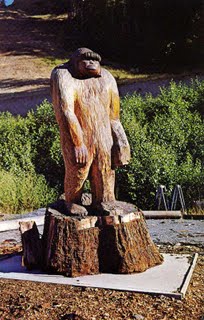
Bluff Creek is the Mecca of the Bigfoot field, the birthplace of the first “Bigfoot” track finds and the site of the filming of the Patterson-Gimlin footage, made famous by the familiar Frame 352 of a female Bigfoot. Visit the nearby Bigfoot wing of the Willow Creek/China Flat Museum in Willow Creek (take 299 east from 101 at Arcata). It houses Bob Titmus’ entire Bigfoot cast collection and other great Bigfoot exhibits. A 23-foot tall Bigfoot statue by Gordon Burns stands outside the museum, the 8-foot tall life-size Bigfoot sculpture by Jim McClarin is nearby, with yet another statue at The Legends of Bigfoot Museum at Garberville, also in Humboldt County. Willow Creek’s annual Bigfoot Daze celebration occurs on the Labor Day weekend and features speakers and family activities.
2. Fouke, Arkansas.
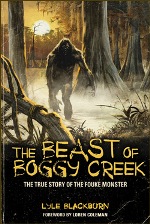
The real life encounters with the Fouke Monster and the filming of the famed Boggy Creek movies occurred near this village. Shop for Bigfoot souvenirs at the local Monster Mart. An annual Boggy Creek Festival is held every April, complete with books to buy, casts to view, and Bigfooters to meet.
3. Ape Canyon-Ape Caves-Mt. St. Helens-Skamania County, Washington.
Here is where the “apes” attacked in 1924 and where their relatives continue to be seen today. Signage memorializes the event in the Ape Caves area. The county serves as a gateway into the Gifford Pinchot National Forest, site of the Skookum Cast find. Due to a high level of activity, Skamania is the only county in the nation where it is against the law to kill a Bigfoot. The annual Carson Bigfoot Daze is usually held in August with Bigfoot lectures, statues, exhibits, and family fun. To the east, along the Spirit Lake Highway, in Kid Valley, there’s a Bigfoot statue near a tourist shop. Drive further north, and find a Bigfoot Crossing sign on the Mt. Baker Highway.
4. Oregon Caves National Monument, Grants Pass, Oregon.
Grants Pass has a rich history of Bigfoot encounters. A local service group, the Oregon Cavemen, established themselves in 1922, and then erected a giant figure of a prehistoric “caveman” at the Interstate 5 exit to Grants Pass. Since the Bigfoot sighting in 2000 at Oregon Caves, local shops have been selling Bigfoot memorabilia. Hillsboro, Oregon holds an annual International Bigfoot Society conference.
5. Mt. Shasta-Trinity Alps, California.
The Trinity Alps are also steeped in Native and modern Bigfoot lore. The Sisson Museum, southwest of Mount Shasta city, has Bigfoot exhibits and souvenirs.
6. Harrison River area, plus Klemetu and the nearby islands off British Columbia.
Sasquatch habitats exist throughout British Columbia. You can also attend the annual International Sasquatch Symposium in Vancouver, or go visit the Sasquatch (Dzunukwa) totem poles at the University of British Columbia’s Museum of Anthropology. Campgrounds named Bigfoot and Sasquatch often have statues of the hairy primates at their entrance, especially in the Harrison Hot Springs area. [The area was the site of a recent conference in tribute to John Green.]
7. Pike National Forest, Colorado.
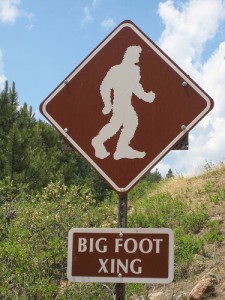
The sightings in the Pike National Forest are a local secret. One authentic road sign in the park warns motorists of frequent Bigfoot crossings.
8. Mt. Hood National Forest, Oregon
Mt. Hood has been an active Bigfoot area since the 1800s. The shops nearby The Dallas, Oregon usually have Bigfoot souvenirs, because this town was formerly the location of Peter Byrne’s now defunct Bigfoot Research Center.
9. Payette National Forest, Idaho
Payette National Forest is one of the hidden secrets of the Bigfoot world; much more is going on in Idaho than most people realize. Serious researchers only are allowed access to Jeff Meldrum’s collection of over one hundred Bigfoot casts at Idaho State University.
10. Jackson County, Murphysboro, Illinois.
The home of the Big Muddy Monster is a quiet town. Low-key local acknowledgments like tee shirts are hard to find but surface occasionally.
11. Tuscarawas-Coshocton counties, Ohio.
On the edge of Appalachia, this is the territory of the Ohio Grassman. An annual Bigfoot conference takes place in Newcomerstown, where casts, books, tee shirts, and more are available.
12. St. Tammany Parish, Louisiana.
This is the stomping ground of the Honey Island Swamp Monster. Boat tour guides are aware of the Monster’s history. An exhibit at the Audubon Zoo in New Orleans has a life-size representation of the Monster.
13. Everglades-Big Cypress Swamp, Florida.
Active pockets of Skunk Ape encounters abound throughout the swampy environments. Shops along Alligator Alley carry artifacts from fake ape heads to tee shirts acknowledging the creatures.
14. Marion County, Texas.
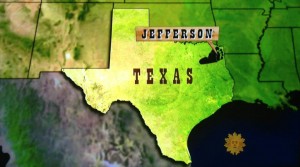
Here lies Caddo Lake; a spooky spot linked to the Boggy Creek activities. An annual Bigfoot conference at Jefferson focuses on the Texas Bigfoot. [The new movie Exists’ locations are modeled on this area, and used, as well.]
15. Pike County, Missouri.
This is the home of Momo, so active in the 1970s, and still seen around today. Talks at the local Louisiana, Missouri, library occasionally discuss Momo’s place in Bigfoot history.
16. Allegheny-Fayette counties, Pennsylvania.
Still haunted by the hairy relatives of Jan Clement’s Kong, this region is abuzz with Bigfoot stories. An annual East Coast Bigfoot Researchers Conference takes place in Jeannette.
17. Lake Louise-Jasper, Alberta.
Reports of the hairy giant of the woods date back to the 1800s in Lake Louise-Jasper. New reports come in yearly. The Natural History Museum, Clock Tower Village, in Banff, has a life-size exhibit of a Sasquatch.
18. Antelope Valley, California
Antelope Valley sees a lot of unusual Bigfoot activity but does not get much publicity, even though it is so close to Los Angeles. South of the city, in Orange County, there is a little Bigfoot museum (with Gigantopithecus skull replica, Bigfoot casts, Bigfoot books) at Knott’s Berry Farm, near their Bigfoot Rapids water rafting ride.
19. St. Clair-Sanilac-Huron-Tuscola-Saginaw counties of Michigan
The “Thumb” of Michigan has seen decades of Bigfoot encounters, with possible migrations into the Sister Lakes and Monroe areas. Recent activity hints that this could be a good location for searches. The Michigan Magazine Museum on M33 between Fairview and Comins has an exhibit of a Bigfoot track cast taken near here.
20. Maine
Ninety-five percentage of the state is covered in trees, and indications are that the downeast side of the Appalachian Mountains, from Aroostook to Kennebec counties, still serves as a route of activity for what the Micmacs called the Gugwes. In Sidney, look up Richard Brown to see his Bigfoot track casts. Jay Carr’s Outdoor Museum, all the way at the very end of Interstate 95, in Houlton, Maine, has a Bigfoot statue outdoors. [In Portland, the International Cryptozoology Museum has many exhibits on Bigfoot/Sasquatch, as well as the former “Crookston Bigfoot” (8 feet tall) and Lee Murphy’s major creation of a Bigfoot head (full sized). The ICM also houses Bigfoot hair samples, over 125 individually different Bigfoot casts, and art related to hairy hominoids. A large popular cultural collection of modern artifacts tracks the presentation of Bigfoot/Sasquatch to the modern world.]
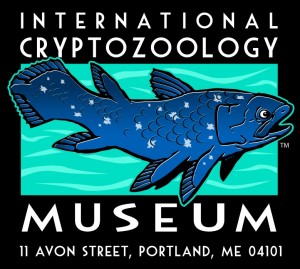
About Loren Coleman
Loren Coleman is one of the world’s leading cryptozoologists, some say “the” leading living cryptozoologist. Certainly, he is acknowledged as the current living American researcher and writer who has most popularized cryptozoology in the late 20th and early 21st centuries.
Starting his fieldwork and investigations in 1960, after traveling and trekking extensively in pursuit of cryptozoological mysteries, Coleman began writing to share his experiences in 1969. An honorary member of Ivan T. Sanderson’s Society for the Investigation of the Unexplained in the 1970s, Coleman has been bestowed with similar honorary memberships of the North Idaho College Cryptozoology Club in 1983, and in subsequent years, that of the British Columbia Scientific Cryptozoology Club, CryptoSafari International, and other international organizations. He was also a Life Member and Benefactor of the International Society of Cryptozoology (now-defunct).
Loren Coleman’s daily blog, as a member of the Cryptomundo Team, served as an ongoing avenue of communication for the ever-growing body of cryptozoo news from 2005 through 2013. He returned as an infrequent contributor beginning Halloween week of 2015.
Coleman is the founder in 2003, and current director of the International Cryptozoology Museum in Portland, Maine.
Filed under Bigfoot, Cryptotourism, CryptoZoo News, Cryptozoology, Sasquatch